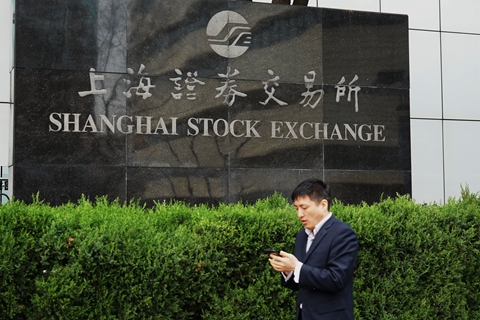China’s Latest Measure to Calm Investors — Default-Resistant Corporate Bonds

Two Chinese firms issued the first corporate bonds using credit risk mitigation (CRM) tools via the Shanghai and Shenzhen Stock Exchange on Dec. 14, taking advantage of the latest move in regulators’ broad push to ease funding conditions for private firms.
China has introduced a series of measures in recent months to support smaller private enterprises amid the sharp fall in the domestic stock market, tight liquidity conditions created by the national campaign to reduce excess debt and risky lending, and weaker business confidence due to prolonged trade frictions with the U.S.
The central bank announced last month that it would increase available financing for micro and small businesses by 150 billion yuan ($21.7 billion) and said that it would promote the use of market-based tools such as CRM warrants, which compensate the bond buyer if the bond issuer defaults, to support bond issuance by private enterprises.
Shanghai-listed fiber optic cable maker Hengtong Optic-Electric Co. Ltd. and Shenzhen-listed Guangzhou Zhiguang Electric Co. Ltd. issued bonds under the CRM initiative on Friday.
The Hentong bond has a face value of 100 million yuan and a coupon rate of 4.9%. In tandem with the bonds issuance, China Securities Finance and Huatai Securities Co. each sold 15 million yuan worth of CRM warrants to investors as a risk buffer. The Zhiguang bond carries a principal amount of 100 million yuan and a coupon rate of 6.8%. China Securities Finance and GF Securities Co. together sold a total of 40 million yuan of CRM warrants to hedge against the risk of default.
“By purchasing both the private corporate bond and the CRM tool associated with it, private companies can reduce the cost of issuing bonds, while investors can be protected,” a brokerage staff member in charge of one of the bond issues told Caixin. “If there’s a risk event, such as bond default, China Securities Finance and the brokerage firms can repay (the bond holders) instead.”
Chinese private companies have defaulted on 67.4 billion yuan worth of bonds so far this year, more than four times the figure in 2017, according to financial data provider Hithink RoyalFlush Info., reducing demand for such issues. But sentiment began to improve after state-backed firms bought stakes in a number of listed private firms and the central bank promoted the use of CRM tools to protect investors, market participants said.
Contact reporter Leng Cheng (chengleng@caixin.com)
- 1China Officials Dismiss Tax Hike Rumors After Tech Selloff
- 2Cover Story: How Gutter Oil Became a Prized Fuel for International Airlines
- 3Prominent Chinese Journalist Liu Hu Detained by Police in Chengdu
- 4Maersk Unit Takes Over CK Hutchison Panama Ports After Court Ruling
- 5China Provinces Set Cautious 2026 Growth Targets
- 1Power To The People: Pintec Serves A Booming Consumer Class
- 2Largest hotel group in Europe accepts UnionPay
- 3UnionPay mobile QuickPass debuts in Hong Kong
- 4UnionPay International launches premium catering privilege U Dining Collection
- 5UnionPay International’s U Plan has covered over 1600 stores overseas






